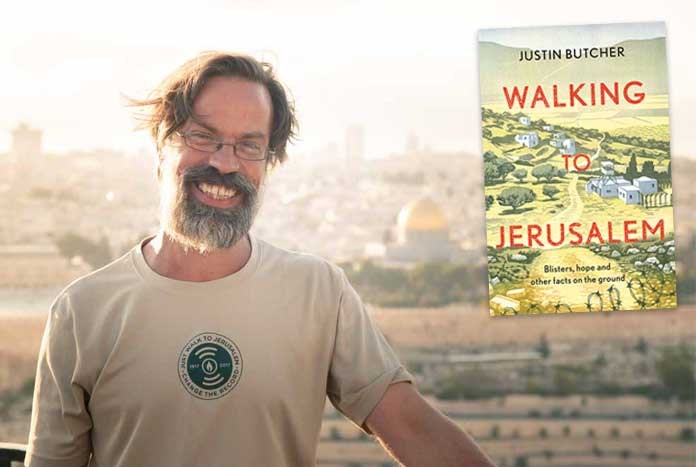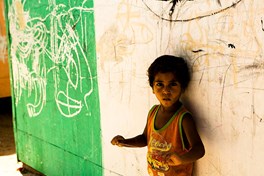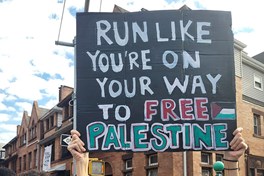This feature article first appeared as the Forward to ‘Walking To Jerusalem’ by Justin Butcher which is available to buy in the Amos webshop.
Forward to ‘Walking To Jerusalem’ by Justin Butcher.
Robert Cohen
For thirty years Amos Trust has chosen to walk a path of faithful and active solidarity with the Palestinian people. It’s built strong partnerships with the dwindling Christian community in the West Bank and Gaza Strip; it’s taken ‘pilgrims’ to see the reality of the Occupation up close; it’s rebuilt Palestinian homes demolished by Israel’s discriminatory planning regulations; and it’s encouraged and funded creative and non-violent resistance to an oppression the world is fully aware of but refuses to take meaningful action against.
The mantra Amos has adopted to express what the future of Israel/Palestine should look like cuts through all the possible constitutional arrangements to focus on one non-negotiable point: Equal rights for all who call the Holy Land home. It always surprises me just how controversial this statement turns out to be. The centenary of the Balfour Declaration presented a particular challenge for Amos.
It was an anniversary likely to be little remembered by the general public in the UK but hugely significant to Palestinians who date their suffering from this act of British imperial hubris. As an organisation that took seriously its commitment to find creative ways to express justice for the forgotten, it needed an act that was bold and distinctive and would be welcomed by Palestinians even if it was ignored back home.
Equal rights for all who call the Holy Land home. It always surprises me just how controversial this statement turns out to be. The centenary of the Balfour Declaration presented a particular challenge for Amos.
A conference or a demonstration or a petition would hardly fit the bill. Something else was required. Justin Butcher, a longtime friend of Amos, had the answer. That thirty-year walk of active solidarity should have a literal expression in this anniversary year. An actual walk. A real pilgrimage. A collective penance. A ‘Just Walk to Jerusalem’ to deliver a simple, clear message that said ‘we’re sorry this has happened to you, it was wrong’.
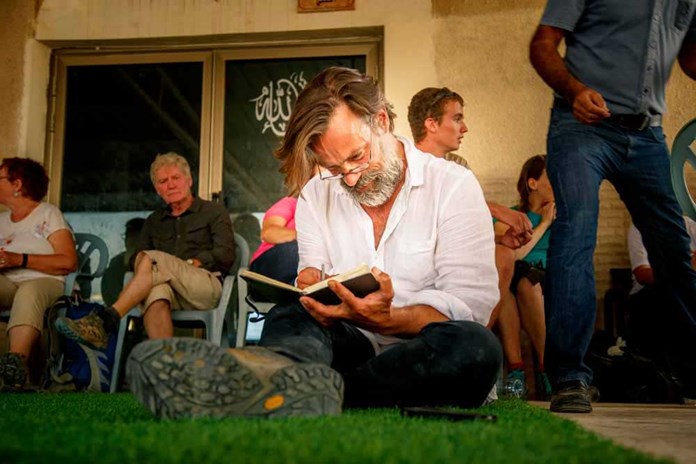
Always writing:
Justin Butcher sitting making notes during ‘Just Walk to Jerusalem’ — October 2017.
The idea was beautiful and crazy. The logistics alone would be an organisational nightmare. The risk assessment would run for pages. It would be a five-month, 3,300-kilometre trek across eleven countries with mountains, rivers and seas to navigate. And then there was no guarantee that the walkers would even be allowed to cross the border into the occupied West Bank, let alone reach Jerusalem.
Every step would be a leap of faith. It was typical of Amos Trust’s culture of moral audacity to say ‘let’s do it!’. Justin’s account of Walking to Jerusalem is a wonderful, unique mix of travelogue, activist’s diary, history lesson, spiritual reflection and, occasionally, first aid for healing wounded feet.
It works on all these fronts, reflecting the daily experience of the walkers themselves – especially the nine aged from 18 to 67 who undertook the entire journey.
The idea was beautiful and crazy. The logistics alone would be an organisational nightmare. The risk assessment would run for pages.
Perhaps an unanticipated consequence of walking to Jerusalem was the encounter it created with a thousand years of European history in all its power, glory and acts of injustice. The medieval cathedrals with their stories of heroic crusades to the Holy Land; the rusting weaponry of the Great War still being ploughed up by French farmers each year; the Jewish experience of Europe, good, bad and deadly; and now, Syrian refugees, the latest arrivals struggling for acceptance.
It’s never easy to know if anything we do in the name of equality and human rights will make a difference. Will the powers that be see the light? Will lives be made better? Will our message be remembered by tomorrow morning? It’s the perennial dilemma faced by activists for the common good all over the world. The odds are stacked against us. If they weren’t, we wouldn’t need activists in the first place.
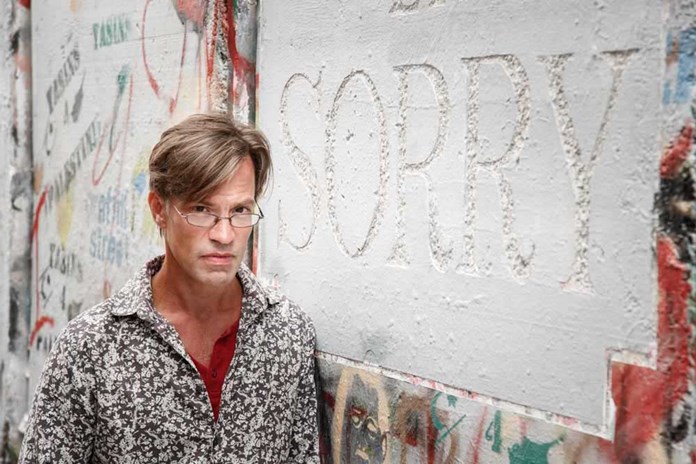
Sorry:
Justin standing outside Banksy’s Walled Off Hotel in front of Banksy’s ‘Sorry’ artwork which he did to commemorate the centenary of the signing of the Balfour Declaration in Bethlehem on 3rd November 2017.
In the context of Israel/Palestine, the standard dilemmas are multiplied. There are good reasons for this. The Palestinian people have had, to quote their most articulate advocate Edward Said, ‘the extraordinarily bad luck’ to have as their adversary the Jewish people, ‘the most morally complex of all opponents’ with ‘a long history of victimization and terror behind them’.
In other words, the Palestinians have paid a very high price for the rest of the world’s anti-Semitism. The activist’s call for Palestinian rights becomes interpreted (sometimes spun) as an attack on Jewish safety in a world that’s proved itself catastrophically unreliable in assuring that safety.
This undoubtedly complicates matters. But it doesn’t change the ‘facts on the ground’ for the Palestinian people. Their dispossession and ongoing oppression is also real. The challenge is to remain mindful of past iniquities without it blinding us to present injustices.
While the walkers were making their way across the continent, I was back home criss-crossing the UK wrestling with what Edward Said meant by ‘the most morally complex of all opponents’. In numerous church halls and Quaker meeting houses I gave my talk on Jewish opposition to Balfour, in 1917 and since then.
Sadly I never spoke at a synagogue, although that’s where I most wanted to tell my story. I tried to make the point that the Balfour Declaration had profound, but vastly contrasting, consequences for Jews and Palestinians. As we got closer to the anniversary, I watched as Jewish religious and community leaders, and Israel’s Ambassador to the UK, Mark Regev, attempted to turn Balfour from a piece of realpolitik into ‘holy scripture’.
While the walkers were making their way across the continent, I was back home criss-crossing the UK wrestling with what Edward Said meant by ‘the most morally complex of all opponents’.
They were turning criticism of Balfour into a curious mix of blasphemy and anti-Semitism. I knew there was nothing blasphemous or anti-Semitic about the Just Walk to Jerusalem. The sanctification of Balfour could only create another roadblock on the path to justice and peace.
We have to thank the Prime Minister, Theresa May, for turbo-charging the final days of the pilgrimage. Helpfully, she repeated her wish to ‘celebrate’ the Balfour anniversary with ‘pride’ during a Prime Minister’s Question time in the House of Commons a week before the Balfour anniversary. It was a comment that revealed much about the Prime Minister’s willingness to dismiss the lived experience of millions of Palestinians.
Mrs May’s acknowledgement that there was still ‘work to be done’ to achieve peace was either a wonderful example of British understatement or, more likely, a failure to recognise the fundamental injustice crammed into those sixty-seven words of diplomatic duplicity.
The Prime Minister’s remarks weren’t headline news in the UK but the Palestinian media were all over it. And here were a bunch of Brits, some of whom had walked a couple of thousand miles, determined to make the apology that their government refused to countenance. The Just Walk to Jerusalem was succeeding in one of its key aims – to disrupt the official UK narrative and show the Palestinian people that they were not forgotten.
The day of the Balfour anniversary itself was an intense, emotional and at times surreal experience for me and for many of the walkers, especially those who’d undertaken the full journey from London to Jerusalem. I never imagined that I’d have the opportunity to hand my sixty-seven-word re-write of the Balfour Declaration, composed a year earlier, directly to Her Majesty’s representative in Jerusalem; or that a couple of hours later I’d be in the centre of Ramallah, probably the only British Jew there, protesting alongside thousands of Palestinians; or that the walkers would all be having lunch as the guests of President Abbas in the Palestinian Authority compound; or that evening I’d be hearing Revd Naim Ateek, the ‘father of Palestinian liberation theology’, preaching in St George’s Cathedral back in East Jerusalem.
The Just Walk to Jerusalem was succeeding in one of its key aims – to disrupt the official UK narrative and show the Palestinian people that they were not forgotten.
But the most telling moment of that day, which seemed to sum up exactly why we were there, was the near failure of the Bethlehem Choir to reach the Cathedral service. With the privilege of free movement, our walkers had travelled a continent to reach Jerusalem.
But a Palestinian Christian choir from Bethlehem, a short car drive away, nearly didn’t make it because they couldn’t get through an Israeli security checkpoint. The six members of the choir arrived, apologetic and out of breath, and slipped their way to the front of the Cathedral to sing Arab melodies to us. Another example of beautiful Palestinian resistance.
The question as to whether the Just Walk to Jerusalem made a difference is, at this moment in time, impossible to answer. Future historians may have the perspective needed. We do not. But it may also be entirely the wrong question.
As Alexandra, one of the volunteer drivers, said to Justin in Turkey, “ … ordinary people like us don’t particularly want to put themselves through potentially life-changing risks by getting involved in activism. It’s because governments and international bodies fail to sort out these terrible situations of injustice. Ordinary people have to get involved.”
I would argue, in the case of Alexandra and all the ‘Just Walkers’, that their passion and conviction makes them not quite so ‘ordinary’. As the second century of Balfour began, with no sign of a just peace in sight, I published a new blog post from Jerusalem that ended with this thought: ‘When hope is so difficult to find there is only one thing left. We can choose where to walk and who to walk alongside.’ Amos Trust has chosen to walk alongside the Palestinian people. And there are times when that must be enough.
Robert Cohen
Amos Trust, trustee
November 2018
— — — — — — —
‘Walking To Jerusalem’ by Justin Butcher is available to buy from the Amos webshop at the discounted price of £13.50 plus p+p
